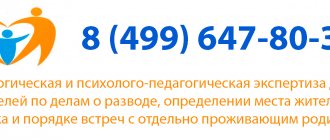Family foster care is the most affordable option for family placement for children who do not have orphan status.
This method is also used for those children for whom adoption cannot be formalized.
The task of foster care and the family raising a child is to socially adapt the child, improve his self-esteem, expand his social circle, as well as take care of physical health with the help of educational, pedagogical and psychological techniques.
Dear readers! To solve your problem right now, get a free consultation
— contact the duty lawyer in the online chat on the right or call: +7 Moscow and region.
+7 St. Petersburg and region. 8 Other regions of the Russian Federation You will not need to waste your time and nerves
- an experienced lawyer will take care of all your problems!
Definition of the term “foster carer”
Foster care is a compensated (paid) form of guardianship for children who have lost their parents temporarily or permanently.
In the first case, we are talking about mom and dad or one of them ending up in the hospital or the emergence of discord in the family, in which it is better for the child not to participate. The second option becomes relevant after the death or deprivation of the rights of parents or adoptive parents. The founders of the patronage service are the guardianship authorities. Teachers are hired by special institutions (shelters, orphanages) where orphans are kept. The baby's health status plays absolutely no role. The establishment of patronage only implies the provision of certain services (care, nursing, feeding) by hired caregivers. The state will continue to provide free treatment, as well as assistance from teachers and child psychologists. Patronage should be distinguished from other forms of guardianship and trusteeship:
- An adoptive family can write an application to the OOP about their desire to take custody of a child left without parents. Adoptive parents acquire the rights and responsibilities of guardians.
- The child lives in a temporary (Foster) foster family until his future fate is determined (appointment of guardians, return to the orphanage, restoration of parental rights, adoption). Unlike other countries, in Russia this form of guardianship is actually undeveloped due to the low standard of living.
- Patronage is translated from French as “guardianship”. They install it over capable citizens (mainly old people). The essence of this type of guardianship is caring for the wards.
- A guardian is appointed for people who have been deprived of the status of “competent” during a court hearing and for children under 14 years of age. In addition to care, he is obliged to support and protect wards from legal entities and individuals and act on their behalf.
- A guardian is required for adolescents from 14 to 18 years of age and partially incapacitated people. He is obliged to look after the ward and protect his property from encroachment by other persons.
Ushakov’s dictionary even calls “patronage” and “patronage” synonymous words. Their essence is to provide patronage to people in need, so for many people there is no difference in the concepts of “foster family” and “foster family.” In fact, their goals and execution methods are slightly different:
- Patronage is a paid form of child custody and is regulated by Art. 14. Federal Law No. 48 and the norms of the Family Code. Hired child care providers perform certain duties specified in the contract and are under the supervision of a government agency.
- Patronage is regulated by Art. 41. Civil Code and is established over sick elderly citizens who are able to think sensibly, but are unable to carry out everyday activities. Authorized persons are obliged to monitor the health of their wards free of charge and help them in everyday life.
What is patronage
Observing a child in the first month of life is also patronage. In this case, it consists in the fact that one or two days after discharge from the maternity hospital, a local doctor from the children's clinic comes to the home of the family where the child was born and examines the baby to see if everything is in order with his health and conditions. its contents, if necessary, gives advice to parents: how to bathe the baby correctly, how often to feed, how to feed a nursing mother, how to express milk, etc. (even down to where it is better to put the crib). Subsequently, the doctor examines the newborn at home once a week, and a nurse does this two more times a week - both monitor the child’s development. Finally, when the baby turns one month old, he is brought for the first time for a medical examination at the children's clinic. This is done on a specially designated day - it is prohibited to bring sick children to the clinic on this day, so that children with their fragile immunity do not catch some kind of infection.
From the point of view of the law, patronage is assistance to an adult capable person whose health condition does not allow him to protect his rights independently. Such a person submits an application to the guardianship and trusteeship authorities, a trustee is appointed to him, with whom he enters into a trust agreement or assignment. Such an agreement may be terminated at the initiative of either party. The trustee, with the consent of the ward, carries out household and other transactions in order to meet the needs of the ward.
Benefits of patronage
Concluding a foster care agreement with a social service will bring certain benefits to newly hired educators:
- Free courses on proper parenting.
- Payments of funds (benefits, alimony) for child support.
- Official work with vacation, seniority, wages, bonuses and sick leave.
- Free assistance from a lawyer, child psychologist, pediatrician, social worker and teacher.
- Useful experience as a teacher.
Foster care will bring no less benefits to children:
- The child will continue to receive state-guaranteed benefits and benefits.
- The orphan will have the opportunity to live in comfortable conditions with people who want to care and look after them, and not in a shelter.
- The baby will receive a good education and the required social skills while being raised in a family.
How much do they pay for a foster child? Benefits, benefits, minimum salary for foster parents
You can get one hundred thousand rubles from the regional budget. The amount is paid only once, at the moment when the family adopts a disabled person. To receive this money, you need to write an application to the social service responsible for adopted children, attach identification documents of the parent, documents from which it follows that he is a citizen of our country, as well as official papers confirming residence (permanent or most of the time) on the territory of this region.
While the media is calculating how much money guardians can receive, these people themselves say that raising a child from an orphanage is not an easy task. It is necessary not only to provide housing for orphans, but also to provide them with decent living conditions. And everything would be fine, but children are different. And this is not surprising, because who is usually handed over to shelters by new parents? Those with whom there may be difficulties. For example, these are children with mental retardation or other physical and mental health conditions that promise problems in the near future. Guardians who take in such babies are prepared for the difficulties of everyday life.
Duration of foster care
The law establishes certain periods of residence for a child in a foster family:
| Term | Description |
| Long | An orphan lives with caregivers until the age of 18 |
| Short | The child is transferred to foster care until he returns to his family or the guardianship authorities find adoptive parents, guardians (trustees) or another foster family. This measure is relevant if the child cannot be in a shelter for certain reasons or if he was urgently removed from his family. |
| Partial | The child visits teachers only during holidays or on weekends. Partial patronage is most often established for teenagers who are preparing for adulthood. |
Control
Foster carers are supervised by specialists from the guardianship council
or foster care service. Clear deadlines for checking the lives of pupils have not been established; it is only stated that comprehensive checks should be carried out annually.
In principle, the condition of inspections should be specified in the patronage agreement , namely:
- on what dates and how often the inspector can visit the teacher;
- what reports, within what time frame and in what form the teacher is obliged to provide the board of guardians.
In conclusion, advice to those who have decided to become a foster carer, guardian or adoptive parent: in order to clearly understand what a foster family is, you need to imagine the interaction of the components of foster care. Professionally trained educators can replace the pupil’s parents for some time, and the state will help financially, physically and morally.
Who can be placed in foster care?
Patronage is established for children who have certain “problems” with their parents:
- they went missing;
- are maintained by medical institutions;
- recognized by the court as partially or completely incompetent;
- are kept in places of deprivation of liberty;
- declared dead;
- do not have the means to support the child;
- are seriously ill;
- limited or deprived of parental rights.
When planning to transfer a child to foster care, employees of the shelter and guardianship authorities act exclusively in his interests. After the child reaches 10 years of age, his consent is required. If we are talking about children who are related (brothers, sisters), then they should be registered together in one family, or no one should be affected. Exceptions are possible only for medical reasons.
Requirements for educators
To get a job, a teacher must be a healthy adult with high moral qualities and personal housing that meets the requirements of the guardianship authorities. The following groups of persons do not have the right to provide patronage for children:
- people without their own housing and registration;
- biological parents;
- previously convicted citizens;
- people deprived of parental or guardianship rights;
- former adoptive parents;
- people with disabilities or health problems;
- incompetent citizens.
Registration procedure
People who want to help children are required to find out whether a foster care service has been created in their city and what the requirements for educators are. For this purpose, they usually contact the administration (district or city). Upon entering the building, you should immediately go to the Board of Trustees. Authorized persons will provide the necessary information. If a patronage service has been established, it is important to remember the following algorithm of actions:
- Contact the patronage service and write a statement.
- Conduct interviews together with family members living with the applicant.
- Undergo a full medical examination.
- Complete teacher training courses (last no more than 80 hours).
- Pass the check (employees of the patronage service will visit the applicant’s family).
- Receive a list of required documents.
- Pass a psychological compatibility test, on the basis of which a child will be selected.
- Meet your future student.
- Draw up an agreement with the patronage service.
The authorized bodies will help you decide on the child’s choice and provide the necessary assistance (medical, pedagogical, psychological). Failure to follow the action algorithm may result in the foster care service rejecting the nominated teacher candidate.
Required Documentation
When registering a new employee, the patronage service carefully examines the candidate. To establish identity and other nuances, the following documents will be required:
- Application for provision of a child for foster care.
- A document confirming official income and a certificate of salary.
- A certificate confirming the availability of living space and its compliance with established standards.
- Results of a medical examination confirming good health.
- Marriage certificate and pension certificate (if available).
- Approval (in writing) of adults living in the same home as the candidate child care provider to become part of a foster family.
- A certificate from the internal affairs authorities stating that the applicant has no previous criminal record.
- Certificate of completion of training courses.
Agreement
When children are placed in foster families, an agreement is drawn up with the trustees within ten days from the moment a positive decision is made. An official document is the main form of cooperation between citizens and social protection authorities, which stipulates the nuances of a minor being in the family.
The standard contract contains information about:
- the rights and responsibilities of educators;
- rights and responsibilities of the patronage service;
- volume of payments;
- validity period of the document;
- possibilities for termination of the contract;
- social guarantees.
The document is provided in two copies. One is given to the trustees, the second is left with the head of the foster care service. If it is necessary to make changes to the text of the document, a protocol is drawn up separately and attached to the agreement.
If several children are assigned to a family, the contract is concluded for each of them.
Adaptation
Today, the essence of the main problem in foster care families is the child’s adaptation to new conditions. Child psychologists distinguish 3 periods of this process:
- The first stage (post-boarding) lasts no more than 1 month. Children behave differently after entering an environment that is foreign to them. Some of them hide in remote corners of the house, while others rejoice or ask countless questions. A gradual change in behavior indicates that a period of adaptation has begun. The child is afraid to say too much, realizing that he may be returned back to the orphanage. If you do not show care and affection to the new resident, he will become withdrawn and may begin to cry at night, showing a disturbed psycho-emotional background. Psychologists advise to pay all your attention to the baby in the first weeks and show that they love him and are not going to give him away. Sometimes there are cases when a child hides donated things, toys and other items, fearing that they will be taken away. There is no point in scolding him, because over time everything will fall into place.
- The second stage takes on average at least 3-4 months. It is characterized by manifestations of the character of the new tenant. Educators begin to notice gaps in the student’s education and emotional underdevelopment. The identified deviations are associated with an insufficient level of education and skills, as well as a lack of attention from parents. Habits acquired in the shelter will worsen the situation. Because of them, scandals and grievances are possible. Ordinary actions (hygienic procedures, cleaning the room) will become a test for a child who is not used to them. If educators do not have enough experience to cope with the problems that have arisen, then it is worth consulting with a child psychologist provided by the institution where the pupil previously lived. Gradually, the child will stop being capricious and become more open.
- The third stage actually indicates complete acclimatization in the foster family. The baby stops feeling like a stranger in the teachers’ home and treats them well. From the outside, you might think that what you see before your eyes is not the orphanage employees and the orphan, but a real family.
The duration of adaptation may vary depending on the age of the child and the situation in which he was before entering the shelter. It is better for educators to find out about these points in advance and consult with a psychologist. To avoid difficulties with adaptation, experts advise remembering the following points:
- The pupil is obliged to obey the teachers, but he also has the right to express his emotions and show his character.
- Persons appointed for foster care must undergo special training so that the child quickly adapts to new conditions.
- To study methods for smoothing out conflict situations, you should periodically consult with a psychologist.
- Minor shortcomings should not be a cause for scandal. Educators are obliged to treat the baby patiently and not pay attention to little things.
Foster care is a paid form of care. In addition to the allowance for the maintenance of the baby, the teacher receives a salary, as he is an employee of the orphanage or shelter where the pupil previously lived. The rights to the baby remain with the foster care service. The teacher is only obliged to comply with the terms of the contract, for which he will receive a salary. He will be registered with the staff of the Orphanage.
Benefits and payments
In 2020-2021, no fundamental changes are expected regarding material support for families with adopted children. Amounts will only be recalculated to take into account inflation. So in 2021, when adopting, you can count on:
- One-time benefit
– 16,759 rubles. If a family accepts a child under 7 years old, a disabled person, or several brothers or sisters at once, it increases to 128,053.08 rubles. - Decree.
According to Art. 257 of the Labor Code of the Russian Federation, when adopting a baby under 3 months of age, parents have the right to 70 days of maternity leave. It is paid in the amount of 100% of the average salary for the last 2 years. If there are several children, then it is extended to 100 days. - Monthly benefit for up to 1.5 years.
It is calculated as 40% of the official salary of the adoptive parent. - Maternal capital. It amounts to 453,026 rubles. Upon adoption, parents can dispose of these funds according to the same rules as at the birth of children.
Parents can also enjoy the right to a tax deduction when paying personal income tax. This is 1,400 rubles for the first and second children and 3,000 rubles for subsequent ones. If a disabled person is adopted, the deduction is 12,000 rubles.
There is also another option for registering adoption. In this case, adoptive parents do not legally form family ties with their children and do not have rights to maternity capital or a monthly allowance for up to 1.5 years and social benefits. But they receive a “salary” depending on the rules established in the region. So in Moscow in 2021, the monthly remuneration is 16,500 rubles for children under 12 years of age and 22,000 rubles until they reach 18 years of age.
Local authorities may provide other incentive options. Thus, in the Nizhny Novgorod region, a one-time payment was established for schoolchildren with a certificate of “4” and “5”.











